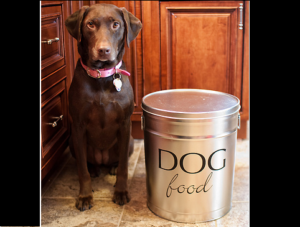
Because Labradors have a specific chemical makeup, what you feed your dog can increase the lifespan and the quality of life of your beloved pet. When choosing a food, the amount of protein, fats, carbohydrates, vitamins and minerals are very important. It is also a good idea to look for dog foods with salmon oil, flax oil and canola oil, all which are great sources of omega 3. These essential fats will optimize the nutritional value of any food, and contribute to healthy skin and a healthy coat. If you are feeding your lab a well balanced dog food, it should cover all their nutritional needs, and extra vitamins and supplements should only be needed in specific situations.
Choosing the best dog food can be overwhelming. There are hundreds on the market. The first thing you should look at is the list of ingredients, and the order which they appear on the label. Meat, poultry, fish or eggs should be the first ingredient. The protein in these foods is essential for energy and muscle growth, as well as helping transport oxygen through the blood stream and to essential organs. Inexpensive dog foods are usually loaded with fillers, such as corn, have little nutritional value, and should be avoided.
I have also read that lamb should be avoided in Labrador breeds. The smell of lamb is undesirable for dogs, so manufacturers usually overcome this by masking the food with artificial flavors and sugars in order to hide the scent.
There are a few conditions inherent to the Lab breed that may require extra nutritional supplementation. An example is that some Labs are prone to allergies, which can cause skin sensitivity. If your Lab has dry and itchy skin or a thinning coat, you may need to add supplements. Before adding anything to your dog’s diet, it is a good idea to talk to your veterinarian.
Labrador puppies go through an accelerated stage of growth and require twice the amount of nutrients as older dogs. Some owners think that growing puppies need extra calcium, but you need to be careful. Too much calcium can actually be harmful, and may cause serious health problems. Magnesium and phosphorus should also be added with any calcium supplementation. Use premium foods specifically designed for puppies, and make sure to weigh your puppy often. This will ensure that you are feeding them the proper amount.
Some experts believe that the best food for your lab, is food that you make yourself. By doing this you know exactly what goes into the food, you can include fresh quality ingredients and avoid all preservatives. Your food should include real chicken, turkey or beef, brown rice and oatmeal, yogurt eggs and cottage cheese. This can be done in as little as 2 hours a week, and can be less expensive than premium, over the counter dog foods.
Feeding your Labradors higher quality food will save you money in the long run. Dogs that are fed inferior diets or economical foods suffer from a variety of illnesses including dry, itchy skin as well as yeast infections, and suffer from liver, kidney and thyroid problems, which can add up to expensive veterinarian bills. Take the time to do some research, and be willing to spend a little extra money now. Your precious pet and your loyal companion is worth it.












Hi Ihave my dog on natural balance this is the 3rd one I tried!
tHE OTHER 2 iBOUGHT FROM THE VET. fISH AND POTATOS, DUCK AND POTATO,
mY LAB USUALLY LOVES ALL FOOD! BUT DOES NOT LIKE THESE FOODS.
SHE HAS ALLERGIES, HAD HER TESTED, TOLD ME ITS NOTHING OUT SIDE, SO I WAS WONDERING WHAT WOULD THINK WOULD BE A GOOD FOOD??
Thankyou Cindy,
I feed my 1.5 year-old “Chicken Soup for the Dog Lover’s Soul”, 4 cups per day. She is maintaining 59-60 lbs, and is very energetic. What worries me is that she seems to poop as much as she eats, and her ribs are visible through her skin. Is the food she is eating providing the right nutrition? Otherwise she is very healthy.
I love healthy Lab stories!
Our Vet likes to see our Labs ribs. He doesn’t want them to get fat!
I am nothing more than a Lab lover, and enthusiast, so my only advice would be to check with your Veterinarian.
[…] signs of stopping. In fact, a study conducted in the UK showed that about half of the country’s dogs were at the time overweight. This has caused an increasing popularity of canine diet drugs as well as “fat clinics” for […]
[…] pet as the breed is generally considered friendly and well-balanced. With regular exercise, a healthy diet and lots of love, the Labrador can live to be 10-12 years old, although some are fortunate enough […]
My black lab, Josey, has always been somewhat itchy– LOVES to scratch, but recently it has escalated to the point where she couldn’t even sleep at night, up scratching 6,7 or 8 times a night– which got me up, too. I felt horrible for her and tried stopping peanut butter, which she LIVES for. Didn’t work. Changed dog food several times and finally landed on a somewhat expensive “holistic” or natural food– Fromm’s Gold for adult dogs. I will testify in court– her scratching cut back probably 75%! She hardly gets up to scratch in the night now. I feel better for her. Her beautiful coat she used to have is somewhat brittle now, so I’m working on finding protein additions to her food (like cooked eggs and chicken) to help bring that shiny soft coat back. Give Fromm’s a try. It is SO worth the money (3x what I was paying for Pedigree)– and the peace of mind for me and comfort for Josey!